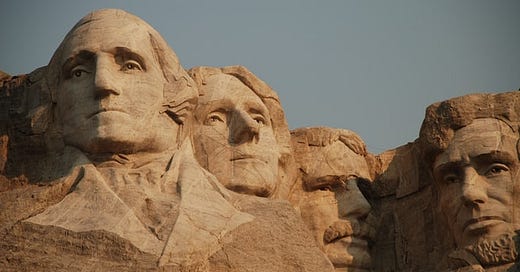Winning English - Mastering Idioms, Slang, and Cultural References
Presidents' Day • Two famous quotes by American presidents • Top dog • Head honcho • Big cheese
A reminder to watch the new video version of Winning English at the bottom of this email. Plus, I’ve started posting on Instagram and TikTok. An example is below.
Happy Monday, everyone! Coming right after Lunar New Year and Valentine’s Day, here in the US we have yet another holiday today - Presidents’ Day. On Presidents’ Day, Americans commemorate - or remember - the birthdays of two of our most revered presidents, George Washington and Abraham Lincoln.
(Note that the holiday is spelled with both a plural and a possessive mark - presidents’. That’s because the day “belongs to” two people.)
In celebration of the holiday - and to share a bit of American culture - I thought I’d talk about a famous saying by each man.

First, George Washington once said, “Associate with men of good quality if you esteem your own reputation; for it is better to be alone than in bad company.”
In other words, if you want people to think you are a good person, you should only hang out with - that is, associate with - good people. If you can’t hang out with good people, don’t hang out with anyone at all. This saying is used in political, business, and social situations.
Second, Abraham Lincoln once said, "You can fool all the people some of the time and some of the people all the time, but you cannot fool all the people all the time.”
This language might be confusing at first. Try reading it one or two more times. “To fool” means “to deceive” or “to trick”. The idea is you might be able to deceive many people for a long time, but eventually people will figure out you are tricking them. This is a very common saying and is used in all situations.
As I’m sure you know, in the US the president is considered the highest level politician and the top government manager. The president is “the boss” of the federal government. To finish today, I thought I’d share some additional slang words for “the boss”.
First, top dog - This one is probably easy to understand. The “top dog” is the leader of a pack of dogs. Be careful with this one. In many cultures, calling someone a dog is insulting. But I promise you it is not insulting in this context in English.
Second, head honcho - In English, the “head” of any group is the leader. “Honcho”, though, is not an English word. Instead, it comes from Japanese! The word began to be used in English during World War II. The leader of a squad of Japanese soldiers was called a “hon-cho”, and many Allied soldiers learned the term either from combat or during imprisonment.
Finally, big cheese - This funny phrase seems to have come from a variety of sources, including the language of Urdu, and its meaning seems to have changed a bit over time. Regardless, today it has nothing to do with the food cheese. Instead, it means “the most important or powerful person in a situation or organization”.
Thanks for reading Winning English! Remember to watch the video or listen to the podcast to reinforce your learning. And as always, if you like Winning English, please tell a friend. Talk soon!
Here’s today’s video version. Enjoy!
And finally, as I mentioned last time, I’ve begun to post short videos on both Instagram and TikTok, as well. Here’s one example. Look me up on those platforms by searching for “winning.english”. Thanks!



